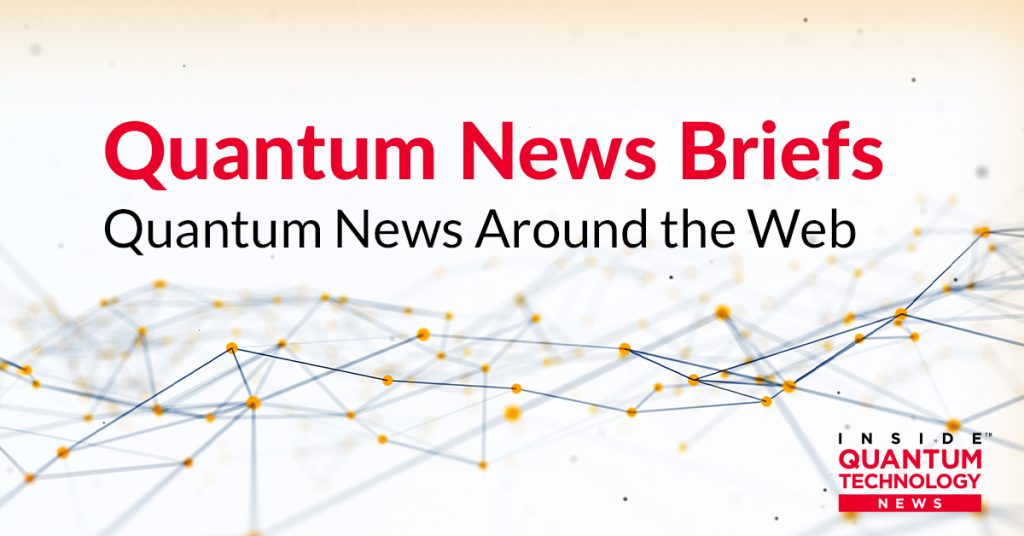In Quantum News Briefs today, we’re discussing partnerships first, as Atos and OVHcloud partner to accelerate development of quantum computing. Then, we showcase UIC’s recent announcement it has joined the Brookhaven National Laboratory-led Co-design Center for Quantum Advantage. The spotlight next moves internationally and to the extraterrestrial with DLR’s focus on space travel and quantum technologies. Finally, and also on the international scene, IQT-News shares the South Korean government plans to develop a 50-qubit quantum computer by the end of 2026
Atos and OVHcloud Partner to Accelerate Development of Quantum Computing
“By announcing this partnership, OVHcloud confirms its ambition to address and make accessible to the greatest number of people the most advanced technologies. The quantum revolution and the deployment of the first use cases cannot be achieved without the Cloud, whose consumption mode and freedom of use are uniquely able to unite expert communities” said Thierry Souche, CTO, OVHcloud.”
***
University of Illinois Chicago Joins Brookhaven Lab’s Quantum Center
University of Illinois Chicago (UIC) has joined the Brookhaven National Laboratory-led Co-design Center for Quantum Advantage (C2QA), making the public research university C2QA’s 24th partner institution.
C2QA is one of five U.S. Department of Energy (DOE) Office of Science National Quantum Information Science Research Centers (NQISRCs) established in support of the National Quantum Initiative Act, which aims to develop the full potential of quantum-based applications in computing, communication, and sensing to benefit national security, economic competitiveness, and leadership in scientific discovery. C2QA’s primary focus is on building the tools necessary to create scalable, distributed, and fault-tolerant quantum computer systems.
UIC Associate Professor of Electrical and Computer Engineering Thomas Searles pointed out, “The co-design center and its affiliated researchers are leaders in advancing quantum-based technologies through scientific research – our partnership with the co-design center opens up incredible opportunities for our students and faculty to partner on innovative discoveries in quantum computing, network and participate in seminars and career fairs.”
***
DLR Opens Institute for Satellite Geodesy and Inertial Sensors in Hanover
The Institute for Satellite Geodesy and Inertial Sensors at the German Aerospace Center (DLR) in Hanover is developing new instruments based on quantum mechanical processes and methods. The areas of application are in space travel, earth observation, navigation and sensors. Around 100 employees will work in six departments at the Hanover and Bremen locations.
Solving socially relevant challenges such as climate change, water resources, energy supply, digitization, future mobility and security will benefit from innovations in quantum technology and quantum sensors. The same applies to future space missions. “Quantum technologies will change the world dramatically,” said Prof. Anke Kaysser-Pyzalla, CEO of DLR at the opening, “With satellite-based satellite geodesy and inertial sensors, it will be possible for us in the future to observe climate change, measure mass changes in the ice masses and to draw conclusions about the budget of the groundwater.”
***
South Korea’s Government Launches Task Force to develop 50-Qubit Quantum Computer by 2026
South Korean research bodies and private companies joined hands to form a government-initiated task force for the development of a 50-qubit quantum computer by the end of 2026 with the aim of catching up with the United States and China, which have been far ahead in quantum computing. This means South Korea has joined an international race to develop quantum computing technology and hardware. However, Science and ICT Minister Lee Jong-ho admitted a technology gap between South Korean companies and competitors in the United States and China.
Dozens of research bodies and private companies, which vowed to support South Korea’s development of a 20-qubit quantum computer by the end of 2024 and boost its capacity to 50 qubits by the end of 2026. “The development of 50-qubit quantum computers and quantum Internet, which will begin in earnest through today’s event, is an obviously difficult challenge considering our technology level and manpower size, but we should cooperate and do our best,” Lee said.
Sandra K. Helsel, Ph.D. has been researching and reporting on frontier technologies since 1990. She has her Ph.D. from the University of Arizona.
